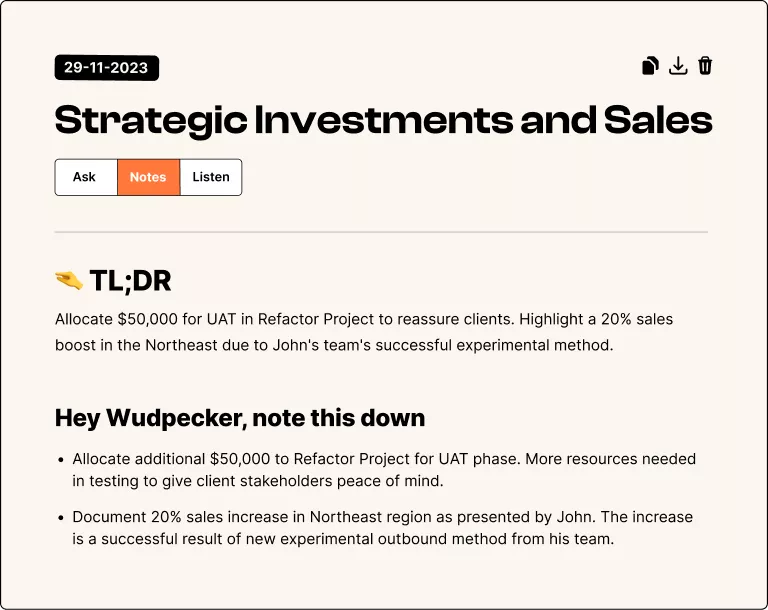Want to learn the best business insights from remarkable speakers at Slush 2023, but don’t have the time to watch the full speeches on YouTube?
You’ve come to the right place. Below is a summary of a speech by Marcelo Lebre, Co-Founder and President of Remote.
(psst: the notes were automatically generated with Wudpecker's AI notetaking tool. If you'd like to check these notes + transcript + audio recording without needing to log in, press here.)
<p class="h1-rich">🤏 TL;DR</p>
A fully remote company with 1200 employees across the world discussed the changing landscape of distributed organizations and the stages of building and managing a distributed team, including finding, hiring, managing, and paying them. Asynchronous work, documentation, and deliberate and inclusive culture were highlighted as crucial aspects of managing a distributed team. Action items include reviewing and updating the company's culture, implementing asynchronous work, documenting all tasks and communication, and establishing a consistent and fair payment structure.
<p class="h1-rich">✨ Summary</p>
Managing Distributed Organizations
- The speaker introduces their company, which is fully remote and has grown to 1200 people across the world.
- They discuss the changing landscape of distributed organizations, noting that there has been a shift from small teams and big corporations to more diverse structures.
- The pandemic served as a catalyst for the acceptance of remote work and bridging the gap between talent and opportunity globally.
Building a Distributed Team
- The speaker explains the stages of building and managing a distributed team: finding people, hiring them, managing them, and paying them.
- They highlight the importance of attracting the best talent globally and utilizing different employment models such as full-time, part-time, and freelancing.
- The speaker discusses various ways to compliantly interact with employees across the world, including direct hiring, freelancing, co-employment, and employer of record.
Challenges and Solutions in Managing Distributed Teams
- The speaker emphasizes the need for asynchronous work to accommodate different time zones and schedules, promoting efficiency and productivity.
- Documentation is key in a distributed organization to ensure effective collaboration and avoid dependency on synchronous communication.
- Culture is a crucial aspect of managing a distributed team and should be deliberate and inclusive, fostering behaviors that promote efficiency and productivity.
Paying Distributed Teams
- The speaker discusses three approaches to paying distributed teams: paying locally based on the local market, a global approach with defined career paths, or a mixed approach with pay bands that are fair at a global scale.
- Consistency and predictability in payment is essential for engaging and retaining employees.



.svg)



.jpg)
















.svg)
